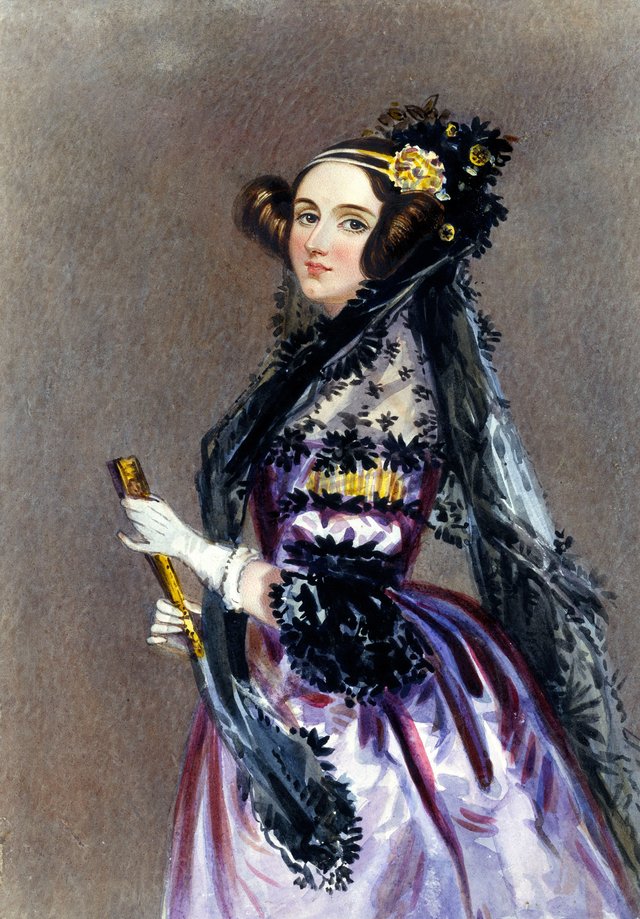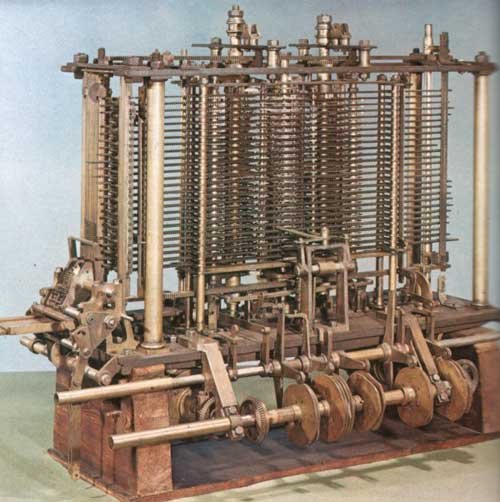Ada Lovelace - Female Scientists Who Aren't Marie Curie
G'day Team,
This is part four in my series on female scientists (who aren't Marie Curie) and I'm starting to regret that I don't have more time to dedicate to the topic. This week I wanted to write about someone a bit different, who contributed to a field of science outside of the 'big 3' (physics, chemistry & biology). Today's post will be a bit shorter, in part because so much of our subject's life was more courtroom controversy than science, but without further ado let's meet Ada Lovelace, the worlds first computer programmer!
Women in Science
Mary Anning
Elizabeth Blackburn
Lise Meitner

Image Source
Ada Lovelace
Unlike many of the women we've spoken about so far, Ada wasn't born into poverty or systemic oppression. She was the daughter of renown poet and philanderer Lord Byron, though she never had a relationship with her father. Ada took to mathematics from a young age and would come to develop the first algorithms that could safely be called computer programs. But how can we claim that a woman who died in 1852 was the world's first computer programmer if the first computer wasn't developed till 1946? Let's find out!
Early Life
Despite being the daughter of Lord Byron, Ada never really knew her father. Just a year after her birth Ada's mother, Annabella, left her father, taking Ada with her. Ada would never meet her father again. Despite absconding with her daughter, Annabella was far from an affectionate mother, often using her daughter merely as a tool in her fight to leverage her ex-husband financially. In a letter to Ada's grandmother and primary carer, Annabella was quoted saying
"I talk to it for your satisfaction, not my own, and shall be
very glad when you have it under your own."
Calling her own daughter "it" was just the start of Annabella's horrible parenting, as all through her life Ada would be subject to her mother's bitter attitudes. Partially because of her deep hatred for Ada's father, Annabella introduced Ada to the world of mathematics at a young age. It was her opinion that a good grounding in the dependable world of numbers would help keep Ada safe from the moral misgivings of her father's more artistically-driven pursuits.
The First Programmer
In 1833 Ada met Charles Babbage, the inventor of the Difference Engine. Ten years later during a translation of an article (by Italian mathematician Luigi Menabrea) on Babbage's new Analytical Engine Ada included a description of a method for calculating Bernoulli numbers using the machine. To truly understand how impressive this was we should first have a look at the Analytical Engine, or at least a model of one of the components as the whole device was never built...

Image Source
This contraption was designed to perform a series of function on input values to creat an output... or in modern terms, a sort of mechanical computation. What Ada had managed to do was to describe how this machine could be calibrated to, of its own accord, produce a string of numbers which comply with a Benoulli sequence. While it may seem an obscure achievement, this practically made Ada the world's first computer programmer, as the first person to utilize the functionality of the Analytical Engine in this way.
Beyond her ability to harness the power of the Analytical Engine, Ada was well ahead of her years in understanding just how a machine such as this could be utilized. She wrote...
"'might act upon other things besides number... the Engine might compose elaborate and scientific pieces of music of any degree of complexity or extent"
Many have postulated that Ada's insight into the capabilities of the machine surpassed those of Gabbage himself, as she was the only one capable of understanding the capacity of the mechanism to use mathetmical models in order to process non-mathematical problems.
Death
Ada was killed by her attending physicians over several months, as they utilized blood-letting to 'treat' an underlying uterine cancer. While Ada's demise was tragic, it was exacerbated in cruelty by her manipulative mother, who drove away friends and family during her last months. Ada passed away on the 27th of November 1852, at 36, the same age her father had died.
Thanks
Thanks for reading team, I hope everyone learned something and I look forward to reading anything you'd like to contribute. As usual please feel free to contribute to this series by using the #womeninscience.
Thanks
-tfc
Resources
The Analytical Engine
Computer History
Mental Floss
Wiki
steemstem

I didn't know anything about her so thanks for sharing.
Is it just me, or do historically important female scientists die young?
My theory is sexist time-travellers
heard of her during a cs101 class back in the day.
and programming language named after...
never seen it until today. something new everyday.
code sample of "hello world" in ada
with Ada.Text_IO; use Ada.Text_IO;
procedure Hello is
begin
Put_Line ("Hello, world!");
end Hello;
I must say Ada Lovelace was indeed a woman of high intelligence, but a short life she lived. She might have contributed more to the society, if she lived longer. Nice write, keep it up.
There's an excellent Victorian cyberpunk novel (definitely not steampunk) by William Gibson and Bruce Sterling, The Difference Engine, where Lovelace and Babbage successfully construct their engines and kick off the Information Age a century early, I highly recommend it.
I have started an odd habit of reading books advised to me through steem, so I might just do that :) Thanks very much!
I've done that a few times myself, too!
Ada Lovelace was genius
I didn't paid attention that women did a lot in science. But now I see! Thank for this nice article @tfcoates
Really cool series and the refreshment from the stories that have already been told million times.
This is hands down the biggest problem. These women's lives are chronicled in so many places, but usually as a list of facts. It's can be hard constructing a 'story' from this list of known facts but it's really worth it!
Have not heard of the Difference Machine but it does not totally surprise as the 1800's was known for inventors and machines and these things were happening. Yeah, there are amazing women found in history, for sure, and it is great to look at them.
Marie was a real genius. One of the greatest scientists to live. One of the greatest people to have ever lived. thanks so much to the others for their great contribution! It was a great woman emancipation. Thanks for your thoughtful post @tfcoates.